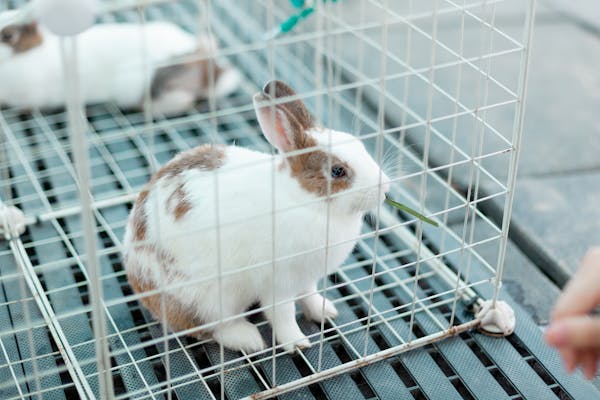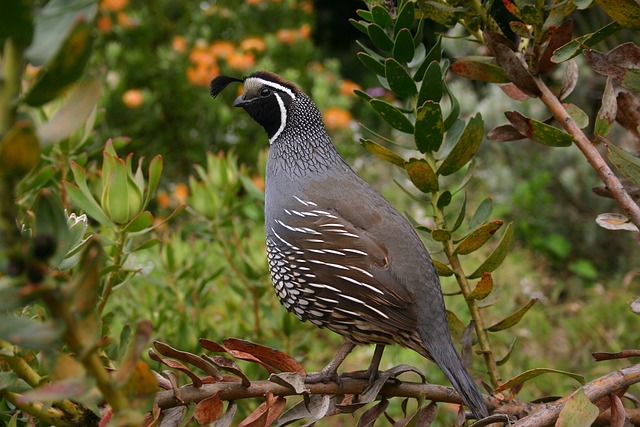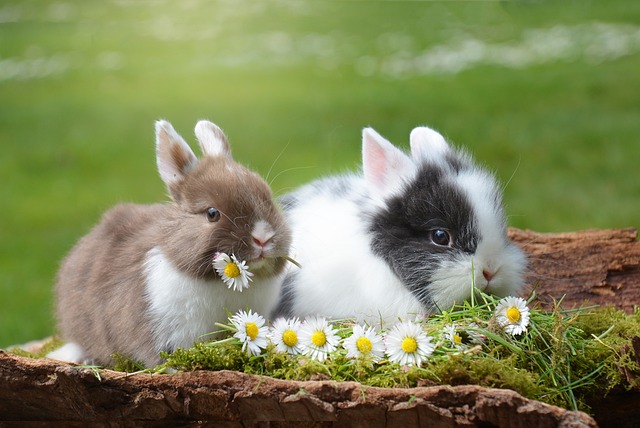
In the realm of farming, raising rabbits can be a joy, but also a challenge, particularly when it comes to keeping them healthy. It's essential to know that rabbits, with their soft fur and twitching noses, are delicate creatures that can easily fall prey to various diseases. Therefore, it's crucial to be vigilant and proactive to ensure their wellbeing.
- Clean Housing:
Regular cleaning Rabbit habitat is a must to prevent bacteria build-up which can lead to diseases. This is very important for their health and happiness.
Start by removing your rabbit from its housing to a safe space. Next, take out all the toys and accessories. Now, it's time to take out the old bedding and get rid of it. Using the dustpan and brush, sweep out any remaining bits. Once this is done, it's time to use the pet-safe disinfectant. Be sure to follow the instructions on the bottle. Spray it inside the cage, wait for the necessary time, and then rinse thoroughly.
After the cage is clean and dry, it's time to put in the fresh bedding. Make sure it's spread evenly, providing a comfortable space for your rabbit. Now, return all the toys and accessories to their places.
- Proper Diet:
Always provide clean and a balanced diet! Did you know Rabbits have a specific diet? They do! Let's hop into understanding what a proper rabbit diet looks like. Rabbits should have a diet that is rich in fiber to keep them healthy. Their main food should be grass hays like Timothy, oat, and brome. Now you might wonder, "What about carrots? Don't rabbits love them?" Well, despite what cartoons suggest, carrots and other fruits should only be given as treats because they have a high sugar content.
Now let's talk about vegetables. Rabbits love them! They should have about 2 cups of fresh leafy greens per six pounds of body weight every day. This includes romaine lettuce, parsley, cilantro, and kale. But remember to introduce new vegetables slowly to their diet to observe for any adverse reactions.
Rabbits also need a small amount of pellets for a balanced diet. Choose high-fiber, low-protein pellets and limit them to about 1/4 cup per six pounds of body weight daily. Rabbits should also have access to clean, freshwater at all times.
Keep in mind that not all foods are safe for rabbits. Avoid giving them foods like yogurt drops, bread, pasta, potatoes, and chocolate as these can make them sick. Avoid sudden changes in diet. Much like humans, rabbits require a healthy diet to build a strong immune system.
- Exercise:
Rabbits love to hop around, play, and do all sorts of fun and exciting exercises. Rabbits need exercise to keep their bodies healthy and their minds stimulated. Exercise for rabbits doesn't mean going for a jog or hitting the gym, it means playtime!
Did you know that rabbits in the wild can run up to 3 miles a day? That's a lot of hopping! They love to explore, dig, jump and twirl around - it's called a binky and it’s how they show they’re happy. For our pet rabbits, we need to try and recreate this kind of fun at home.
Now, you might be wondering, "how can I help my little bunny exercise?" It's simple! Give them a safe, spacious area where they can run around freely. A rabbit-proofed room or a large pen is perfect. Add in some rabbit-safe toys like tunnels, balls, and even cardboard boxes for them to play with and they will be hopping around in no time.
And remember - never force your rabbit to exercise. They should do it when they feel like it. Some days they might be full of energy, hopping around and doing lots of binkies. Other days, they might want to relax and take it easy. That's okay too.
- Avoid Stress:
Rabbits are also sensitive creatures that can easily become stressed with loud noises or overcrowding. To ensure they stay happy and healthy, it's important to avoid causing them stress.
it's essential to understand that rabbits are prey animals. This means they are naturally cautious and may become stressed if they feel threatened or unsafe. One way to avoid this is by providing a secure environment for your rabbit. This could be a hutch with plenty of hiding spots or a room in your house where they can roam freely.
Additionally, rabbits require a balanced diet to stay healthy. A sudden change in diet can cause stress and potentially lead to health problems. Ensure your rabbit's diet consists mainly of hay, with a small amount of fresh vegetables and rabbit pellets.
Remember rabbits are social animals and need companionship to avoid feeling lonely and stressed. If you have a single rabbit, consider getting them a friend. However, make sure to introduce new rabbits slowly and under supervision to avoid any fights.
Lastly, like Humans, regular exercise is essential for a rabbit's physical and mental health. Make sure your rabbit has enough space to hop around and explore. Avoid keeping them in a small cage for long periods as this can cause stress and boredom.
- Regular Check-ups:
Regular rabbit check-ups can help spot any potential health problems early. These might include overgrown teeth, which is a common problem in rabbits, ear infections, or even digestive issues. Your veterinarian might also suggest a suitable diet for your Rabbit, and give them any necessary vaccinations to protect them from diseases.
It's important to remember that while rabbits may seem small and easy to care for, they require just as much attention and care as any other pet. Rabbits can hide their illnesses well, making it even more crucial to have regular check-ups.
A typical rabbit check-up might involve a thorough examination of your bunny's body, teeth, ears, and eyes. The vet may also listen to their heart and lungs, and check their coat for any signs of parasites. Regular weight checks are important too, as sudden weight loss or gain could be a sign of an underlying health issue.
- Parasite Control:
One common problem in rabbit farming is parasites like fleas, ticks, and mites.. There are two main types of parasites that affect rabbits: external and internal. External parasites live on the skin, like fleas and mites. Can you imagine how itchy that must be? Internal parasites live inside the body, like worms. These can make rabbits feel very poorly.
So, how can we help Rabbits from parasites? Well,It’s crucial to keep their living area clean. This means removing old food and cleaning their hutch regularly. We can also use special medicines to keep the parasites away. These might come as a spot-on treatment, like the ones we use for dogs and cats, or as a tasty chew or a powder that we can mix into their food.
Remember, our Rabbits can't tell us when they're feeling poorly, so it's up to us to keep an eye on them. If your rabbit's eating less, losing weight, or itching a lot, it might have parasites. A visit to the vet can help sort this out.
- Vaccinations:
Also, do not ignore the importance of vaccinations. Rabbits are susceptible to certain diseases, but thankfully, we can protect them through vaccinations.
The first major illness we can protect against is Myxomatosis. This is a deadly disease passed on by fleas, mosquitoes, and even direct contact with other infected rabbits. It's a nasty virus that can cause severe suffering. Then there's the Rabbit Viral Hemorrhagic Disease (RVHD), a rapid and often fatal illness. Rabbits can catch it through direct contact with infected rabbits or from contaminated environments.
Here's the good news! Vaccinations can protect against these diseases. A vet can give your rabbit a single annual vaccination that covers both Myxomatosis and RVHD. It's a tiny prick that can save a life. Just remember, even with vaccinations, it's important to keep a close eye on your rabbit's health. Regular check-ups, a balanced diet, and lots of love are also essential. Vaccinations are just one part of the puzzle in keeping our bunny friends safe and sound.
- Quarantine New Rabbits:
Did you know it's important to quarantine new rabbits before introducing them to your existing pets? Quarantine means keeping your new rabbit in a separate space, away from your other pets. This is crucial to ensure the health and safety of all your rabbits. New rabbit could potentially bring with them certain diseases or parasites that can be harmful to your existing rabbits. Even if they may appears healthy, they might be carrying these harmful agents without showing any signs.
During the quarantine period, you should monitor the new rabbit for any signs of illness. This might include changes in eating habits, changes in behavior, or physical signs like a runny nose or eyes. If you notice anything unusual, it's important to get in touch with a vet as soon as possible.
The quarantine period can vary, but a good rule of thumb is to keep the new rabbit separate for at least two weeks. This gives you ample time to observe the rabbit and ensure they are healthy before introducing them to your other pets.
Remember, during this period, you should also be careful to avoid any cross-contamination. This means washing your hands thoroughly before and after handling the new rabbit, and not sharing any toys or accessories between the new rabbit and the existing ones.
A healthy rabbit is a happy rabbit. By following these tips, you can help ensure your rabbits live long, healthy, and happy lives. Enjoy your time with these wonderful small animal, and take good care of them. They depend on you for their well-being.
Please, watch the below related Videos:
-
Useful things to know before investing in Rabbit Farming
-
Tips For Keeping Your Rabbits From Diseases
-
Most Profitable small Animals To Raise
< Previous
10 Useful things to Know Before Investing In Rabbit farming | Agro Investment
Next >
Complete Guide to grow Cleome Gynandra Plant in your garden| Medicinal Plant


